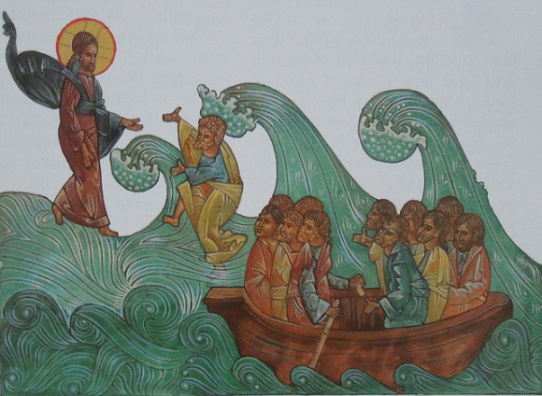In the gospel of Matthew 14: 22-32, the miracle is not that Jesus walks on water, but that Peter even tries.
If you have ever learned an instrument, ridden a bicycle, or learned any new physical skill, you will remember that as you learned, it was difficult to sustain a newly acquired ability.
You might have a moment where you disappear into the action and everything is working smoothly. Then you think about what you are doing and mangle the music, or fall off the bike. A brief loss of focus and the competence vanishes and is replaced by a feeling of frustration that you will never master the skill.
So it is with faith, Peter steps out of the boat, experiences a brief moment of competence and belief that he can do the impossible, he can participate in the miracle. He, for just a moment, gives his whole being to the enterprise and walks upon the water.
However, Peter, like all of us, is only human and sustaining that level of devotion and focus is beyond him.
That said, the fact that he tried is the true miracle. He not only steps out onto the water, but asks Jesus to make his walking on the water a command. Peter opened himself fully to the idea that all things might be possible if Jesus asked it of him.
Then the wind comes up, he is distracted and falls into the water. The small, intimate bubble of quiet that had seemed to hold just Peter and Jesus is broken into by the elements that fishermen know, fear. In a heartbeat, Peter goes from trusting disciple to fearful waterman. The connection between student and teacher is not enough to keep Peter walking on top of the water.
However, when he falls, he only loses faith that he could emulate Jesus, he doesn’t lose faith that Jesus can save him from the depths. He goes from the high of ‘I can do this myself!’ to the low of ‘Please catch me!’ that is a universal human experience shared by anyone who who has wobbled down the street on a bicycle or played their first flawless scale on a guitar.
But just because I fall off my bike, does not mean that my teachers have forgotten how to ride. I may lose faith in my ability to perform a new skill; however, if my teacher is wise and patient, they will reach out to me and help me try again until I can master the elation of momentary success and turn it into a persistent skill.
Jesus may be frustrated that Peter fell, but he still reaches out his hands and pulls Peter back into the boat fully justifying Peter’s faith in him as a teacher.
The best teachers will let us fail, with out letting us fall.
How else can we learn to have faith?
Kristin Fontaine is an itinerant Episcopalian, crafter, hobbyist, and unstoppable organizer of everything. She spends a lot of time thinking about the meaning of life and her relationship to God and it all spills out in the essays she writes. She recently embarked on a new adventure with her husband, supporting him as he launches Dailey Data Group, a statistical consulting company

